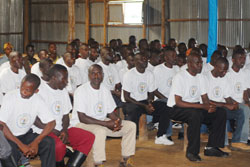Although demobilized soldiers elsewhere in the world especially in the Sub-Saharan Africa usually have great difficulties re-establishing themselves into civilian life, in Rwanda the story is different.The Rwanda Demobilisation and Reintegration Commission (RDRC) is a Government commission that manages and implements the reintegration of ex-combatants.


Although demobilized soldiers elsewhere in the world especially in the Sub-Saharan Africa usually have great difficulties re-establishing themselves into civilian life, in Rwanda the story is different.
The Rwanda Demobilisation and Reintegration Commission (RDRC) is a Government commission that manages and implements the reintegration of ex-combatants.
The Rwanda Demobilization and Reintegration Program (RDRP) has been in existence for more than 10 years, and has successfully demobilized and reintegrated over 70,000 ex-soldiers. Of these, some were formerly in RPA, ex-FAR, FDRL, FOCA while others are from RDF.
Many that have been demobilized and reintegrated into civilian life are now leaders, civil servants, lawyers, judges, business men and women, while others are respected farmers living in the hills of Rwanda.
In 2001, a Rwf300,000 RDRC reintegration grant was given to several. Jean Marie Vianney Habumuremye, a demobilized ex-FAR benefited from this grant and now owns a business worth Rwf190 million.
After living through war, with an uncertain future and degrading conditions in the refugee camp in Eastern Congo, Habumuremye decided to return home in 1998.Ten years on, Habumuremye is now one of the few individual medium scale employers in the country.
"I regret all the time I wasted in DRC, I would have far better off business-wise, but I’m glad I made the decision of coming home,” he said.
Gashugi Faustin is another demobilized soldier who spent eight years in the jungles of the Democratic Republic of Congo. He compares coming home to resurrection from the dead.
"It is a good feeling returning home after all those years. Back in the DRC we were living like fish out of water,” he said.
Reintegration allows soldiers, their families and community members to not only join together, but also learn how to work together while creating a cohesive community.
Ladislas Gatsimbanyi is another demobilized ex-FAR soldier and Kimironko resident who couldn’t wait to pack his bags and come home.
He said: "Living in a foreign land as a rebel is a terrible thing! When the opportunity of returning home came by, I didn’t think twice about seizing it! I came back home, used the money I got from RDRC and started a small shop.”
"I have acquired my own house and my children go to school,” Gatsimbanyi said.
In an interview with The New Times, Jean Sayinzoga, the RDRC chairman, said the biggest reason why demobilization and integration in Rwanda is a success is because the commission is built around, "the belief in equal treatment of all Rwandans regardless of their birth circumstances or history.”
"All demobilized soldiers are equally and fairly treated. That is why, our commission has in the past demobilized and treated Ex-RPA soldiers in the same way it treats ex-FDLR or Ex-RDF officers and men,” Sayinzoga said.
Today, a reintegration grant of Rwf120,000 is given to demobilized combatants to enable them smoothly integrate socially and economically.
"It’s so encouraging to learn that the ex-combatants are a very big asset wherever they live. No criminal offences are associated with them. They never waste their grant and they habour no ethnic discrimination,” he said.
martin.bishop18@yahoo.com


